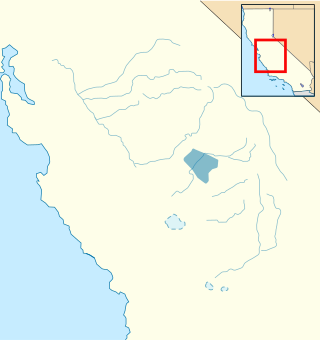Related Research Articles

Yokuts, formerly known as Mariposa, is an endangered language family spoken in the interior of Northern and Central California in and around the San Joaquin Valley by the Yokuts people. The speakers of Yokuts languages were severely affected by disease, missionaries, and the Gold Rush. While descendants of Yokuts speakers currently number in the thousands, all languages apart from Valley Yokuts are now extinct.

The Mono are a Native American people who traditionally live in the central Sierra Nevada, the Eastern Sierra, the Mono Basin, and adjacent areas of the Great Basin. They are often grouped under the historical label "Paiute" together with the Northern Paiute and Southern Paiute – but these three groups, although related within the Numic group of Uto-Aztecan languages, do not form a single, unique, unified group of Great Basin tribes.

Valley Yokuts is a dialect cluster of the Yokutsan language family of California.

The Yokuts are an ethnic group of Native Americans native to central California. Before European contact, the Yokuts consisted of up to 60 tribes speaking several related languages. Yokuts is both plural and singular; Yokut, while common, is erroneous. 'Yokut' should only be used when referring specifically to the Tachi Yokut Tribe of Lemoore. Some of their descendants prefer to refer to themselves by their respective tribal names; they reject the term Yokuts, saying that it is an exonym invented by English-speaking settlers and historians. Conventional sub-groupings include the Foothill Yokuts, Northern Valley Yokuts, and Southern Valley Yokuts.

Yok-Utian is a proposed language family of California. It consists of the Yokuts language and the Utian language family.

The Chalon people are one of eight divisions of the Ohlone (Costanoan) people of Native Americans who lived in Northern California. Chalon is also the name of their spoken language, listed as one of the Ohlone languages of the Utian family. Recent work suggests that Chalon may be transitional between the northern and southern groups of Ohlone languages.

The Tübatulabal are an indigenous people of Kern River Valley in the Sierra Nevada range of California. They may have been the first people to make this area their permanent home. Today many of them are enrolled in the Tule River Indian Tribe. They are descendants of the people of the Uto-Aztecan language group, separating from Shoshone people about 3000 years ago.

The Plains and Sierra Miwok were once the largest group of California Indian Miwok people, Indigenous to California. Their homeland included regions of the Sacramento Valley, San Joaquin Valley, and the Sierra Nevada.

Santa Rosa Rancheria is the reservation of the Santa Rosa Indian Community of the Santa Rosa Rancheria. It is located 4.5 miles (7.24 km) southeast of Lemoore, California. Established in 1934 on about 40 acres, the Santa Rosa Rancheria belongs to the federally recognized Tachi Yokuts tribe. It is the site of the Tachi Palace Hotel & Casino. The population was 517 at the time of the 2000 United States Census and had increased to 652 by the 2010 United States Census. In 2010, 288 residents were under 18 and 29 (4.4%) were 65 and over.
Tamcan or Tammukan was a local tribe of Delta Yokuts-speaking natives in the U.S. that once lived on the lower reaches of California's San Joaquin River in what is now eastern Contra Costa County and western San Joaquin County, California. The Tamcans were absorbed into the system of the Spanish missions in California in the early nineteenth century; they moved to Mission San José, near the shore of San Francisco Bay, between 1806 and 1811. At the mission, they and their descendants intermarried with speakers of the San Francisco Bay Ohlone, Plains Miwok, and Patwin Indian languages. Mission Indian survivors of these mixed groups gathered at Alisal, near Pleasanton in Contra Costa County, in the late nineteenth century.

Buena Vista was a Yokuts language of California. It was spoken in at least two local varieties around Buena Vista Lake in Kern County, California," in the villages of Hometwoli, Loasau, Tuhohi, and Tulamni.

Tule–Kaweah is an extinct Yokuts language of California.

Kings River was a Yokutsan language of California.
Southern Valley Yokuts is a dialect network within the Valley Yokuts division of the Yokutsan languages spoken in the Central Valley of California.
Chukchansi (Chuk'chansi) is a dialect of Valley Yokuts spoken in and around the Picayune Rancheria of Chukchansi Indians, in the San Joaquin Valley of California, by the Chukchansi band of Yokuts. As of 2011, there were eight native semi-speakers.
Yawdanchi was a dialect of Tule-Kaweah Yokuts that was historically spoken by the Yawdanchi Yokuts people living along the Tule River in the Tulare Lake Basin of California. The Yawdanchi dialect is closely related to the Wiikchamni dialect.
Hometwoli was a dialect of Buena Vista Yokuts spoken in the southern portion of the Tulare Basin of California near Kern Lake.
Northern Valley Yokuts is a dialect network within the Valley Yokuts division of the Yokutsan languages spoken in the Central Valley of California. Among the languages belonging to the network are Chawchila, Nopṭinṭe, Kechayi, Dumna, Dalinchi, Toltichi, and Chukchansi. Of these, Kechayi, Dumna, Dalinchi, Toltichi, and Chukchansi are frequently grouped under the label Northern Hill dialects.

Yawelmani Yokuts is an endangered dialect of Southern Valley Yokuts historically spoken by the Yokuts living along the Kern River north of Kern Lake in the Central Valley of California. Today, most Yawelmani speakers live on or near the Tule River Reservation.

Yoimut or Yo'yomat was a Yokuts woman who was the last speaker of the Chunut language of central California. Josie Alonzo has also been recorded as the last "full-blooded" Chunut. She was a noted polyglot, speaking 8 different Yokutsan languages along with English and Spanish. She was among the last indigenous inhabitants of Tulare Lake, before being forcibly removed by Anglo-American settlers. She was an informant to anthropologists Frank F. Latta and A. H. Gayton.
References
- 1 2 3 Golla, Victor (2011-08-02). California Indian Languages. University of California Press. ISBN 9780520266674.